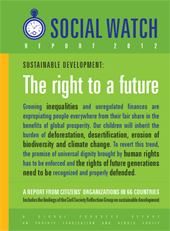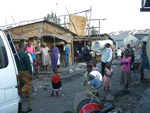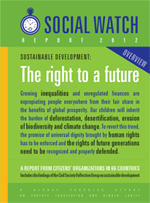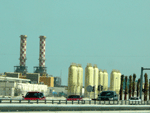Social Watch Report 2012
Published on Thu, 2012-03-01 13:12
The production and trade indicators that are usually used to measure prosperity are the product of unsustainable consumption patterns in the richest social sectors and countries, and these patterns promote the plundering of natural resources, damage the environment and do nothing to reduce poverty. The Social Watch Report 2012 enhances our understanding of this phenomenon and of proposals to set concrete limits that will be put forward next June at the United Nations Conference on Sustainable Development in Rio de Janeiro (Rio 2012). |
Published on Thu, 2012-02-16 14:35
In spite of international commitments, 1,600 million people all over the world are living in deficient housing, and in the developing South 828 million lack adequate water and sanitation services. In the Social Watch Report 2012, experts warn that these problems are aggravated by inequalities between and within countries, privatization, the disappearance of communal property, migration, forced eviction, land speculation and climate change. |
|
Source: . Published on Mon, 2012-01-02 12:06
Social Watch report blames inaction of governments and mal-action of private sector for inequality |

Growing inequalities and unregulated finances are
expropiating people everywhere from their fair share in the benefits of global prosperity.
|
Published on Fri, 2011-12-23 12:38
As governments all over the world, from industrialized and developing countries alike, have cut their expenditures in the last two years and prepare further savings for the next, the first casualties are the welfare programs, as contributions from grassroots organizations included in the Social Watch Report 2012 make apparent. But austerity measures have proven useless to overcome the crisis, and could even plunge the world into a recession, according to a growing number of experts and international agencies. “Austerity fiscal policies that cut on social spending started to be implemented in debt-affected countries and are now spreading even to countries that do not suffer from debt problems or fiscal deficit,” wrote the coordinator of Social Watch, Roberto Bissio, in the overview of the report. |
Published on Fri, 2011-12-09 13:28
Rights are the basis of sustainable development, said Roberto Bissio, coordinator of Social Watch, when asked to summarize the conclusions of the new report of this international network of civil society organizations, launched at the United Nations headquarters in New York on Friday, on the eve of the Human Rights Day. Over sixty national reports by independent citizen groups form the core of the Social Watch Report 2012, which this year focuses on the rights of future generations. |
Published on Mon, 2011-12-05 07:53
The bad usage of water is depleting this scarce and vital resource in the Arab region, preventing the development of the countries and sinking the people’s hope of a better life, according to the Social Watch Report 2012, that will be launched this week in New York. |
SUSCRIBE TO OUR NEWSLETTER










